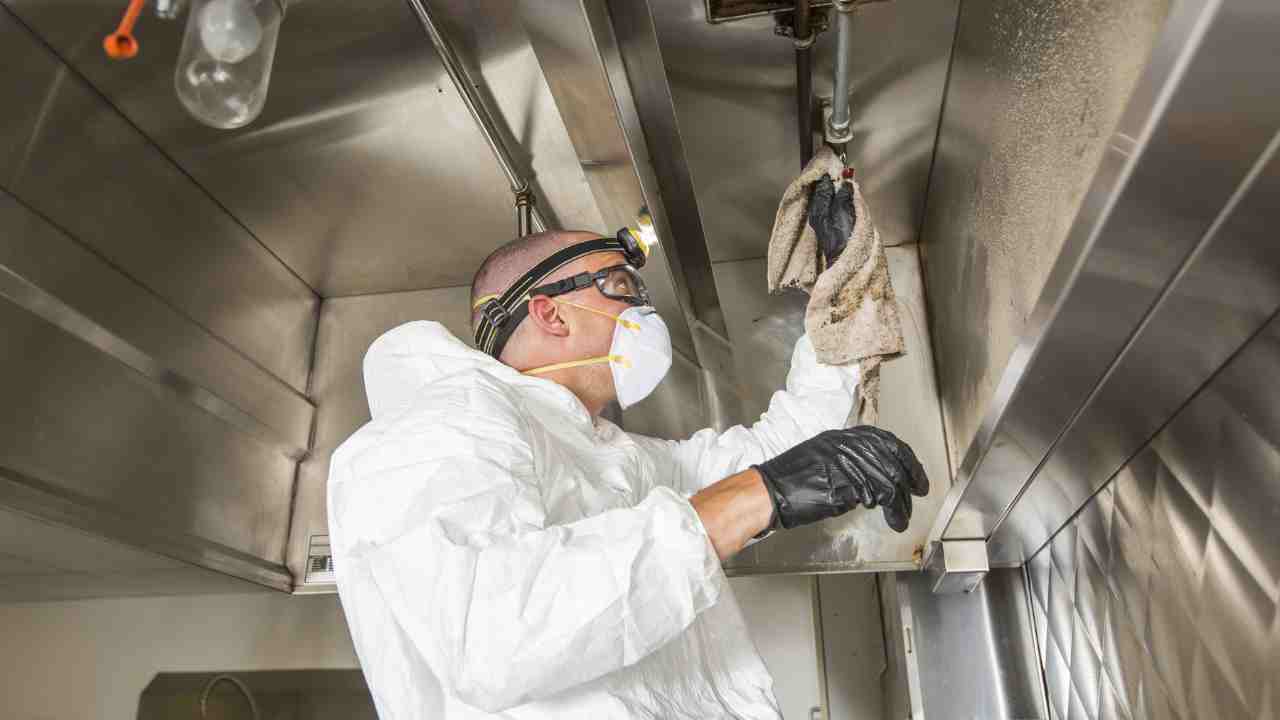Best Frequency for Cleaning Kitchen Exhaust

Ontario-wide Kitchen Exhaust and Hood Cleaning – Best prices and service guaranteed.
Keeping the kitchen exhaust clean is crucial for maintaining a healthy and safe environment in any commercial or residential kitchen. A clean kitchen exhaust system not only improves air quality but also reduces the risk of fire hazards. However, determining the best frequency for cleaning the kitchen exhaust can be a challenge. In this article, we will explore the factors that influence the cleaning frequency and provide valuable insights to help you make an informed decision.
The Importance of Cleaning Kitchen Exhaust
Before delving into the best frequency for cleaning the kitchen exhaust, it is essential to understand why regular cleaning is necessary. The kitchen exhaust system plays a vital role in removing smoke, grease, and odors from the cooking area. Over time, these substances accumulate in the exhaust system, leading to several issues:
- Reduced air quality: A dirty kitchen exhaust can release harmful pollutants into the air, which can cause respiratory problems and allergies.
- Increased fire risk: Grease buildup in the exhaust system is highly flammable and can ignite easily, posing a significant fire hazard.
- Inefficient ventilation: Accumulated grease and debris can obstruct the airflow, reducing the effectiveness of the exhaust system in removing smoke and odors.
- Health code violations: Neglecting to clean the kitchen exhaust regularly can result in violations of health and safety regulations, leading to penalties and potential closure of the establishment.
Given these potential risks, it is crucial to establish a cleaning frequency that ensures the kitchen exhaust system remains clean and functional.
Ontario-wide Kitchen Exhaust and Hood Cleaning – Best prices and service guaranteed.
Factors Influencing Cleaning Frequency
The frequency at which you should clean your kitchen exhaust depends on various factors. Let’s explore the key factors that influence the cleaning frequency:
Type of Cooking
The type of cooking conducted in the kitchen is a significant factor in determining the cleaning frequency. Different cooking methods produce varying levels of grease and smoke. For example, kitchens that primarily use deep frying or grilling techniques tend to generate more grease and require more frequent cleaning compared to kitchens that focus on baking or boiling.
Volume of Cooking
The volume of cooking also plays a role in determining the cleaning frequency. High-volume kitchens, such as those in restaurants or hotels, experience more intense cooking activities and generate a larger amount of grease and smoke. These kitchens typically require more frequent cleaning compared to low-volume kitchens, such as residential kitchens.
Local Regulations and Standards
Local health and safety regulations may specify the cleaning frequency for kitchen exhaust systems. It is essential to familiarize yourself with these regulations and ensure compliance. Failure to adhere to the specified cleaning frequency can result in penalties and legal consequences.
Inspection Results
Regular inspections of the kitchen exhaust system can provide valuable insights into its cleanliness and functionality. If an inspection reveals excessive grease buildup or other issues, it may be necessary to increase the cleaning frequency to address the problem promptly.
Ontario-wide Kitchen Exhaust and Hood Cleaning – Best prices and service guaranteed.
Recommended Cleaning Frequencies
While the specific cleaning frequency may vary depending on the factors mentioned above, here are some general guidelines to consider:
Residential Kitchens
In residential kitchens, where the volume of cooking is typically lower, cleaning the kitchen exhaust system once every six months is often sufficient. However, if you frequently engage in high-grease cooking methods, such as deep frying, it may be necessary to clean the exhaust system more frequently, such as every three to four months.
Commercial Kitchens
Commercial kitchens, especially those with high-volume cooking, require more frequent cleaning due to the increased grease and smoke production. Here are some recommended cleaning frequencies for different types of commercial kitchens:
- Low-volume commercial kitchens (e.g., small cafes, bakeries): Cleaning every three to six months.
- Medium-volume commercial kitchens (e.g., restaurants, pubs): Cleaning every one to three months.
- High-volume commercial kitchens (e.g., large restaurants, hotels): Cleaning every one to two months.
It is important to note that these are general recommendations, and the actual cleaning frequency should be determined based on the factors specific to your kitchen.
Ontario-wide Kitchen Exhaust and Hood Cleaning – Best prices and service guaranteed.
Case Studies and Statistics
Several case studies and statistics highlight the importance of regular kitchen exhaust cleaning:
Case Study 1: Restaurant Fire
In 2018, a restaurant in a busy city experienced a devastating fire that originated from the kitchen exhaust system. The fire quickly spread throughout the establishment, causing significant damage and leading to its closure for several months. The investigation revealed that the exhaust system had not been cleaned for over a year, resulting in excessive grease buildup and a higher risk of fire.
Case Study 2: Improved Air Quality
A study conducted by a university research team examined the impact of regular kitchen exhaust cleaning on indoor air quality. The study found that after cleaning the exhaust system, the levels of airborne pollutants, such as particulate matter and volatile organic compounds, significantly decreased. This improvement in air quality contributed to a healthier and more comfortable environment for the kitchen staff and customers.
Ontario-wide Kitchen Exhaust and Hood Cleaning – Best prices and service guaranteed.
Statistics: Fire Incidents
According to the National Fire Protection Association (NFPA), an estimated 8,000 restaurant fires occur in the United States each year. The leading cause of these fires is cooking equipment, including kitchen exhaust systems. Proper cleaning and maintenance of the kitchen exhaust can significantly reduce the risk of fire incidents, protecting lives and property.
Regular cleaning of the kitchen exhaust is essential for maintaining a safe and healthy environment in any kitchen. The best frequency for cleaning the kitchen exhaust depends on factors such as the type of cooking, volume of cooking, local regulations, and inspection results. Residential kitchens typically require cleaning every six months, while commercial kitchens may need more frequent cleaning based on their volume of cooking. Case studies and statistics emphasize the importance of regular cleaning in preventing fire hazards and improving air quality. By adhering to the recommended cleaning frequencies and staying proactive in maintaining a clean kitchen exhaust system, you can ensure a safer and more efficient kitchen environment.
Learn more about “Kitchen Exhaust Cleaning Frequency” right here.
Frequently asked questions about Best Frequency for Cleaning Kitchen Exhaust.

How often should I clean my kitchen exhaust hood?
As an expert in kitchen exhaust hood cleaning, I recommend cleaning your kitchen exhaust hood at least every three to six months, depending on the cooking frequency and the type of cuisine prepared. Regular cleaning ensures optimal performance and prevents grease buildup, which can pose fire hazards and compromise air quality.
Can I clean my kitchen exhaust less frequently if I don’t cook often?
While less frequent cooking may lead to fewer grease deposits, it’s still essential to clean your kitchen exhaust hood regularly. Even occasional cooking releases airborne particles that can accumulate over time, leading to potential fire risks and decreased ventilation efficiency. I advise cleaning the exhaust hood every six months as a minimum precautionary measure.
What are the consequences of not cleaning my kitchen exhaust hood regularly?
Neglecting regular kitchen exhaust hood cleaning can lead to several issues. Accumulated grease can obstruct airflow, reducing the ventilation system’s efficiency, which may cause unpleasant odors and poor indoor air quality. Additionally, the excess grease poses a severe fire hazard, increasing the risk of kitchen fires and potential damage to your property.
How can I tell if my kitchen exhaust needs cleaning before the recommended time frame?
As a kitchen exhaust hood cleaning expert, I advise monitoring your exhaust system regularly. Signs indicating the need for earlier cleaning include noticeable grease buildup on the hood and filters, reduced smoke and odor extraction efficiency, rattling noises during operation, and a distinct greasy smell in your kitchen.
Can I clean my kitchen exhaust hood myself, or should I hire a professional?
While some basic cleaning can be done by the kitchen owner, a thorough and effective kitchen exhaust hood cleaning requires professional expertise and specialized equipment. As an expert in the field, I strongly recommend hiring a certified kitchen exhaust hood cleaning service to ensure a deep, comprehensive cleaning that adheres to industry standards, minimizes fire risks, and optimizes the exhaust system’s performance.
- Best Frequency for Cleaning Kitchen Exhaust
- hood cleaning
- kitchen exhaust cleaning
- restaurant hood cleaning







